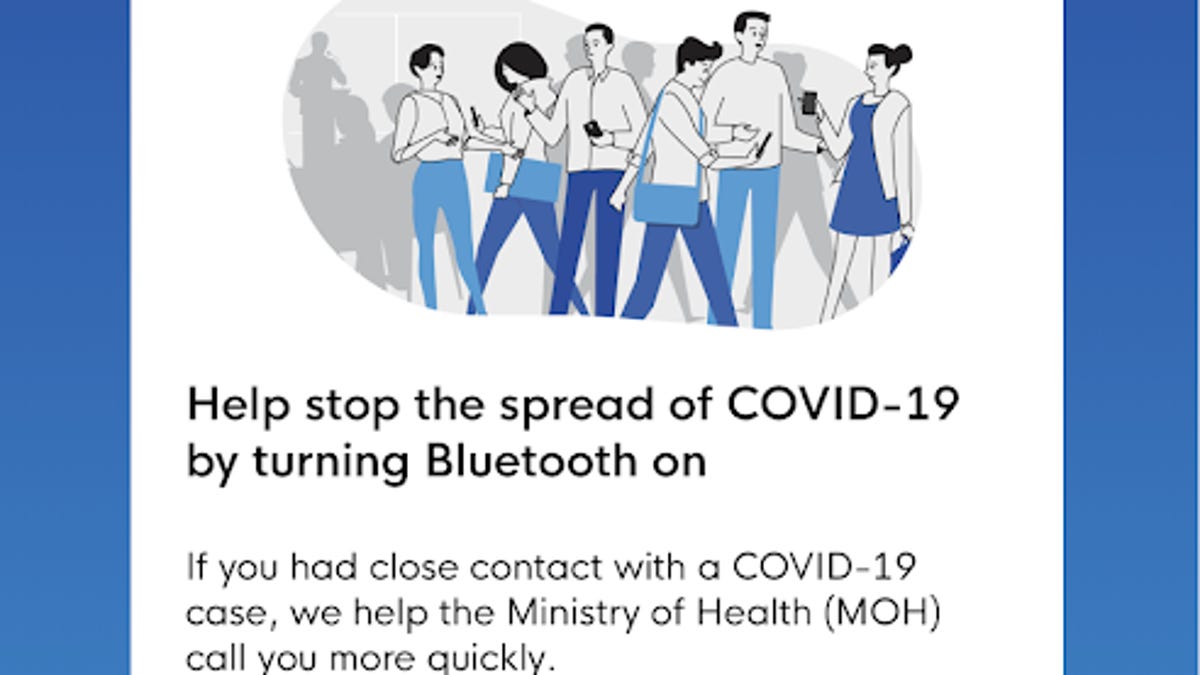Tech isn't solution to COVID-19, says Singapore director of contact tracing app
Contact tracing using mobile apps has shortcomings in life or death situations, the government official says.

The TraceTogether app from Singapore's government uses Bluetooth on people's phone to track who they've been in contact with.
Companies like Apple and Google have stepped up to help health officials track the coronavirus pandemic, but a government official behind Singapore's contact tracing app is warning against an overreliance on the technology.
In a post on Singapore's Government Digital Services page, Jason Bay, the agency's senior director, called out where mobile contact tracing falls short in response to Apple and Google's announcement on Friday.
The two tech titans announced Friday that they're working together to create tools that would allow iOS and Android devices to communicate with each other through Bluetooth technology. The idea is to use this for contact tracing -- a method where health care workers look through a patient's history and who they've potentially exposed to infections.
Contact tracing apps work by logging every device whose Bluetooth connection has been nearby, and if one person on that history marks that they have tested positive for COVID-19, people who have been near that device would be notified and can take measures to self-quarantine.
Coronavirus updates
Singapore rolled out its own contact tracing app, TraceTogether, in March, while researchers at MIT are also working on developing their own tools for health officials.
In the weeks since Singapore released its contact tracing app, the government has seen technology's shortcomings for tracking COVID-19. Despite the government's public campaign to the country to download the app, only about one in six people in Singapore have actually done it, Singapore's national development minister Lawrence Wong said on April 1.
Bay also noted several issues with an overreliance on mobile contact tracing, pointing out that the apps would not have flagged cases where the coronavirus spread, including an incident in Washington where 45 members of a choir were diagnosed with COVID-19.
"If you ask me whether any Bluetooth contact tracing system deployed or under development, anywhere in the world, is ready to replace manual contact tracing, I will say without qualification that the answer is, no," Bay said in the post.
Apple and Google didn't respond to requests for comment. The two companies are not releasing their own contact tracing apps -- they are releasing tools that public health officials can use to make their own software.
He noted that artificial intelligence in health care can't pick up on nuances that human workers can, like false positives and negatives and that TraceTogether was designed to supplement manual tracing, not replace it.
For example, in the case of the Washington choir infections, a contact tracing app designed for tracking people within a two-meter range would not have flagged anyone there -- but if a person was adjusting the algorithm on a case-by-case basis, it could have, Bay said.
The senior director also noted that contact tracing apps don't account for factors beyond proximity like environment and activity, which health care workers do. A person could be flagged as having been in contact with someone through an app, but it could have been someone standing outside through a window, for example.
That was the situation in Israel, where a woman reportedly was forced into quarantine because a tracking app mistakenly believed she had been in contact with her partner when she was waving at him through his window.
"There are lives at stake," Bay said. "False positives and false negatives have real-life (and death) consequences."
Bay isn't the only one to call out limits of using technology to track COVID-19. Last week, the American Civil Liberties Union released a whitepaper noting its shortcomings and threats to digital privacy.
"The experience of Singapore's contact tracers suggest that contact tracing should remain a human-fronted process," Bay said. "Contact tracing involves an intensive sequence of difficult and anxiety-laden conversations, and it is the role of a contact tracer to explain how a close contact might have been exposed -- while respecting patient privacy -- and provide assurance and guidance on next steps."

